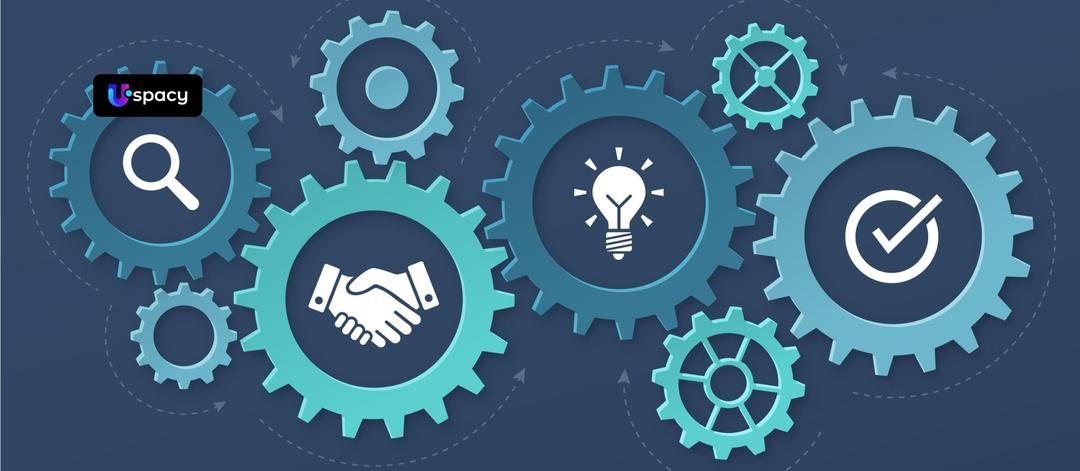Getting started with CRM – expert insights from Uspacy
October 8, 2025
4-minute read
Dmytro Suslov

A CRM is your business control panel—if it shows the real picture rather than just storing data. Uspacy brings leads, communications, tasks, and analytics together in a single Space, making the team’s day-to-day work transparent.
A CRM system has become an essential tool for managing client interactions. Companies purchase software but often face challenges in effective implementation.
Teams frequently don’t know how to get the most value from these services. This CRM guide will help beginners master the basics of working with the system.
CRM basics: how to get started
Before diving into how to use a CRM system, it’s important to customize it to fit your business needs.
Registration and account setup
The registration process starts with selecting a pricing plan and creating a company profile. Uspacy provides an onboarding guide for the initial setup. You’ll need to fill out basic fields, including the organization’s name and contact information.
Team onboarding
Integrating a CRM isn’t possible without involving your team. The administrator invites colleagues via email, assigning each the appropriate roles. Proper permission management ensures information security and a clear structure of responsibilities.
Client data import
Transferring contacts is a key step in CRM implementation. Preparing the file requires structured data and a check for duplicates. Uspacy provides a simple CSV upload feature with customizable field mapping. Once imported, ensure the data has been correctly transferred.
Key CRM tools
Modern CRM systems offer a set of tools to optimize client management.
Contact and lead management
New client profiles are created via a special form with essential fields. Interaction history is automatically recorded in the system. Each client profile contains information such as:
- call history;
- email communication;
- manager comments;
- order details.
Contact segmentation allows for targeted marketing campaigns.
Deal and sales funnel management
The sales funnel visualizes the client’s journey from initial contact to deal closure. Each company customizes the statuses to fit its unique business processes.Uspacy provides a visual funnel featuring drag-and-drop cards for easy movement between stages, along with the option to assign closing probabilities to each deal.
Tasks and reminders
Manager workload is planned through a task system with priority and deadline settings. Tasks are linked to specific clients or deals. Automatic deadline notifications help ensure important actions aren’t missed.
Analytics and reporting
Sales data is recorded automatically, and analytical features transform it into visual charts and graphs. Uspacy emphasizes intuitive dashboards that highlight key business metrics.
Process automation in CRM
Automating routine tasks is a key benefit of CRM systems. It helps free employees from repetitive work and minimizes the chance of errors.
Document generator
Uspacy automates document creation through a convenient template generation tool. The system fills out data from client or deal profiles into designated fields, allowing contracts, invoices, and commercial proposals to be created in just a few clicks. This ensures a consistent formatting standard, eliminates manual entry errors, and accounts for different details required by various counterparties for different document types.
Smart objects
Uspacy enables the creation of custom entities with configurable parameters to extend standard CRM functionality. Users can add warehouses, projects, technical directories, and other elements, adapting the system to specific business needs without involving developer assistance.
Integrations with sales channels
Modern CRMs integrate with various communication channels: email, telephony, messengers, and social networks. Uspacy offers integration with a wide range of services, including messengers (Viber, Telegram, WhatsApp), social networks (Facebook, Instagram), email clients, telephony, as well as marketplaces and CMS platforms (Shopify, Weblium). This creates a unified communication hub for client interaction without switching between applications.
Practical tips for effective CRM use
Implementing a CRM is only the first step toward optimizing client interaction processes. To achieve maximum efficiency, it’s essential to follow best practices for daily system use.
Regularly update data
Updating new clients and comments in a timely manner ensures the data stays accurate. Every contact must be recorded immediately following the interaction. Documenting the interaction along with key conversation points and client needs is crucial.
Use advanced filters
A flexible filtering system allows you to quickly find the right clients based on various parameters such as statuses, responsible persons, dates, and other characteristics. Smart filters help create complex queries for effective segmentation of the client base and data analysis.
Analyze reports weekly
Regularly reviewing analytics helps identify trends and adjust marketing strategies. It is recommended to create a set of standard reports for monitoring key metrics such as conversion rates at different funnel stages, average deal value, and sales cycle duration.
Engage your team
The CRM should be integrated into daily routines, not seen as extra work. Showing each employee the system’s value is crucial. Offering incentives for active use increases team motivation.
Uspacy’s role in streamlining CRM for businesses
Uspacy CRM was developed with local business needs at its core, offering both powerful tools and user-friendly design.
Key features of Uspacy CRM
Uspacy CRM’s key advantage lies in its unified ecosystem, which brings together CRM tools, task management, and third-party integrations on a single platform. Its user-friendly interface makes it accessible even to newcomers, simplifying implementation in companies without dedicated IT staff. In addition to a multilingual interface, it also offers features tailored to the specific needs of local businesses.
Benefits for the sales department
The sales department gains access to a powerful set of tools, including:
- a visual sales funnel,
- analytics,
- automation of routine processes.
Visual tools help sales managers track the status of each deal, while department heads gain a clear view of overall team performance.
Reasons to choose Uspacy
The core advantage of Uspacy is its all-in-one digital workspace, combining communication, collaboration, and CRM functionalities within a single platform. It minimizes the need for multiple tools, provides an open API for easy integrations, and delivers dedicated support tailored to business requirements. The pricing is clear and transparent.
Conclusion
Working with a CRM system is not just about managing a contact database — it’s a comprehensive tool for growing your business by systematizing client management. Proper implementation and use of the service can improve sales efficiency and optimize internal company processes.
Uspacy makes CRM training easier with its user-friendly interface and customization designed to meet the unique needs of businesses. The system supports systematic growth by emphasizing key performance metrics and fostering long-term client relationships.
Updated: October 8, 2025


